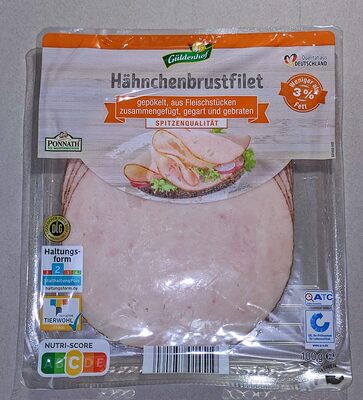
Barcode: 4061458014519
Hähnchenbrustfilet
DOUBTFUL
📝 Reason: The product contains Hähnchenbrustfilet (chicken breast fillet) which is marked as Doubtful due to the absence of Halal certification. According to Islamic dietary laws, meat must be slaughtered in a Halal manner and certified to be considered Halal. The absence of such certification raises doubts about its compliance.
📄 Certificates: None
Ingredients:
Details
Understanding the Halal Status of Hähnchenbrustfilet
When shopping for meat products like Hähnchenbrustfilet (chicken breast fillet), many consumers inquire about Halal certification. This becomes particularly important for those adhering to Islamic dietary laws, which dictate that meat must be sourced from animals that have been slaughtered in a specific manner and certified Halal. Sadly, Hähnchenbrustfilet is classified as having a doubtful Halal status due to the absence of any Halal certification.
What Makes Hähnchenbrustfilet Doubtful?
The primary reason for the doubtful Halal status of Hähnchenbrustfilet lies in its source. The product contains chicken that is not certified Halal, raising concerns regarding its compliance with Islamic dietary laws. For a product to be considered Halal, the animal must be slaughtered according to Islamic principles, which, in this case, is unverified.
Ingredients and Their Halal Status
Let’s delve deeper into the ingredients that make up Hähnchenbrustfilet:
- Hähnchenbrustfilet: The main ingredient, which has a doubtful status due to the lack of Halal certification.
- Jodiertes Speisesalz (Speisesalz, Kaliumjodat): Generally considered Halal as it is essentially table salt iodized with potassium iodate.
- Dextrose: This sweetener is generally considered Halal and is used in various food products without concern.
- Stabilisator: Triphosphate (E451): While this stabilizer is not listed as Haram or in doubtful E codes, confirmation about its sourcing is crucial for Halal compliance.
- Antioxidationsmittel: Natriumascorbat (E301): Generally included in Halal E codes, this antioxidant is thus acceptable in Halal diets.
- Konservierungsstoff: Natriumnitrit (E250): Another additive listed under Halal E codes, making it compliant.
- Rapsöl: Commonly derived from rapeseeds, this oil is generally accepted as Halal.
Exploring E-Numbers in Hähnchenbrustfilet
We often encounter various E-numbers when examining processed foods. Here’s the breakdown based on the ingredients in Hähnchenbrustfilet:
- E451 (Triphosphate): Typically used to enhance texture and moisture, its Halal status depends on the sourcing of raw materials.
- E301 (Natriumascorbat) and E250 (Natriumnitrit): Both these preservatives are acceptable in Halal food production.
Brand and Certification Context
Currently, Hähnchenbrustfilet does not carry any Halal certification, which is crucial for Muslim consumers looking to align their dietary choices with their beliefs. The absence of a reputable certificate raises questions and doubts about the compliance with Halal requirements.
For those exploring dietary options, it’s vital to consider products that provide clear Halal certification from credible bodies. This not only assures the consumer of the Halal status but also enhances trust and accountability within the food industry.
Final Thoughts
In conclusion, while several ingredients in Hähnchenbrustfilet are generally considered Halal, the product itself cannot be classified as such due to the absence of Halal certification. Muslims looking to adhere to their dietary laws should exercise caution when consuming this product. Always seek clear certifications from known authorities to ensure compliance with Islamic dietary standards.

